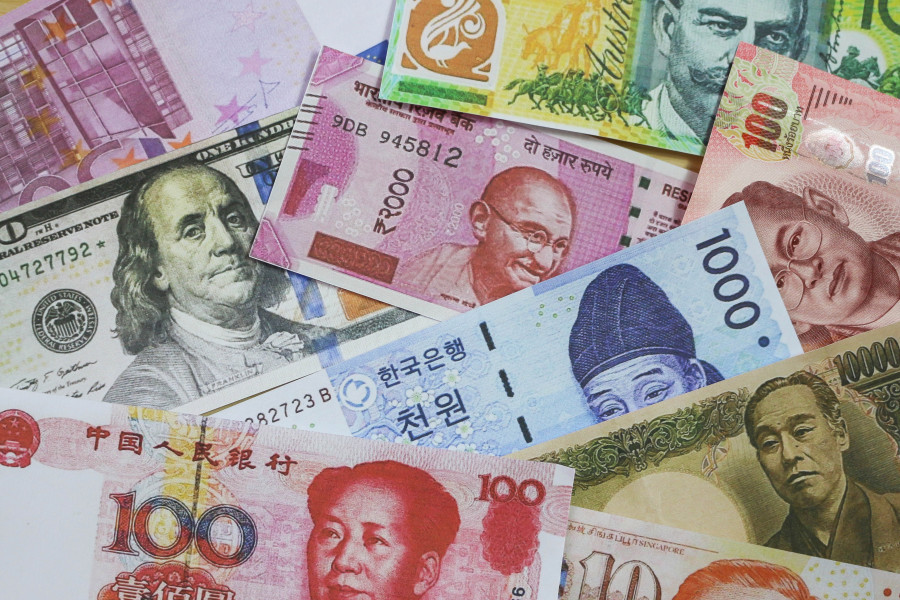Money
Further curbs on foreign currencies for imports
The central bank has also decided not to provide foreign exchange more than twice a year to people travelling to foreign countries.
Prithvi Man Shrestha
Amid depleting foreign currency reserves, the central bank has reduced the amount of foreign currency that importers of various agricultural goods can buy from banks to pay for the imports.
According to the Unified Directives issued by the Nepal Rastra Bank on Friday, importers of agricultural products can buy a maximum of $50,000 per import. Government approval is always needed to import such products.
Such importers need to take approval of the government for importing grains and grain-based food items; oil and ghee; milk and dairy products; fruits and vegetables, frozen and processed fish and meat items, dried fruits like walnut and cashew nut; children’s food; drinks; chocolate and chewing gum; snacks; spices; honey; and sugar and other processed food items.
Narayan Prasad Pokharel, deputy spokesperson at the central bank, would not go into specific provisions. But he said, “We have taken a number of measures to discourage other imports as well.”
The country’s import of agricultural goods is on the rise as people’s income increased over the years with remittances playing a crucial role in boosting people’s purchasing capacity.
According to a study conducted by the National Planning Commission, Nepal imported agricultural goods worth over Rs200 billion in the fiscal year 2019-20 although such goods are produced within the country. Most agricultural goods came from India, according to the study titled ‘Status of Export and Import of Agriculture Goods.”
External sector of the economy is at risk as the country’s imports are many times higher than exports. This has led to a higher outflow of foreign exchange while the country is struggling to boost its foreign exchange earnings due to a slowdown in remittance flows and tourism income due the Covid-19 pandemic, according to the central bank and the Department of Customs data.
Exports, imports, foreign exchange reserves and remittances are part of the external sector of the economy.
Foreign exchange reserves and inflows of remittances declined for four months in a row since the start of the current fiscal year, according to the central bank.
So, the government and the central bank in recent weeks have been taking measures to discourage imports and encourage inflow of remittances.
On December 20, the central bank made it mandatory for importers to keep 100 percent margin amount [guarantee given by importer to the bank] to open a letter of credit (LC) to import a number of goods.
As per the central bank, traders need to keep 100 percent margin to open a letter of credit for importing alcoholic drinks, tobacco, silver, furniture, sugar and food items that contain sweets, glucose, mineral water, energy drinks, cosmetic products, shampoos, hair oils and colours, caps, footwear, umbrellas, and construction materials such as bricks, marble, tiles and ceramics, among others.
Motorcycle and scooter importers and those importing diesel-powered private automobiles are now required to keep a 50 percent margin to open a letter of credit. As potential importers have been relying on short-term credit without depositing any cash, the central bank's directive is expected to stem the import of these products.
The central bank has also decided not to provide foreign exchange more than twice a year to people traveling to foreign countries. A Nepali citizen can buy a maximum $1500 per foreign trip. Earlier, the central bank had also set a limit on foreign exchange allowed for the import of silver.
But the central bank has allowed the importers of peas, betel nuts, dried dates and peppercorn to get custom clearance even in the current fiscal year 2021-22 if their shipments had taken place before the end of last fiscal year 2020-21.
The government had allowed the import of peas, betel nuts, dried dates and peppercorn until mid-July by setting quantitative limits for each item—80,000 tonnes for peas, 25,000 tonnes for betel nuts, 5,000 tonnes for dried dates and 15,000 tonnes for peppercorn within the last fiscal year, which ended in mid-July 2021.
The government has, however, not taken any decision regarding providing foreign currency for the import of these items in the current fiscal year 2021-22.
So, the importers who had failed to take delivery of these goods within the last fiscal year have been facing difficulty in getting customs clearance.
But the unified directives issued on Friday have opened the door for the importers of the aforementioned four food items to receive foreign exchange and customs clearance even in the current fiscal year if their shipment had taken place in the last fiscal year.
Earlier the central bank had announced to provide foreign currency for such imports if the shipments had taken place before the end of the last fiscal year, but the bank withdrew the announcement within hours amid reports of dispute over the issue between the central bank and the finance ministry.
Pokharel, deputy spokesperson at the central bank, said that new provision was made to ease the situation for the importers of these items.
“Importers whose shipments arrived last fiscal year but have not been able to get customs clearance can submit an application at the central bank for foreign currency and the bank will take decisions on a case-by-case basis,” he said.




 8.99°C Kathmandu
8.99°C Kathmandu














